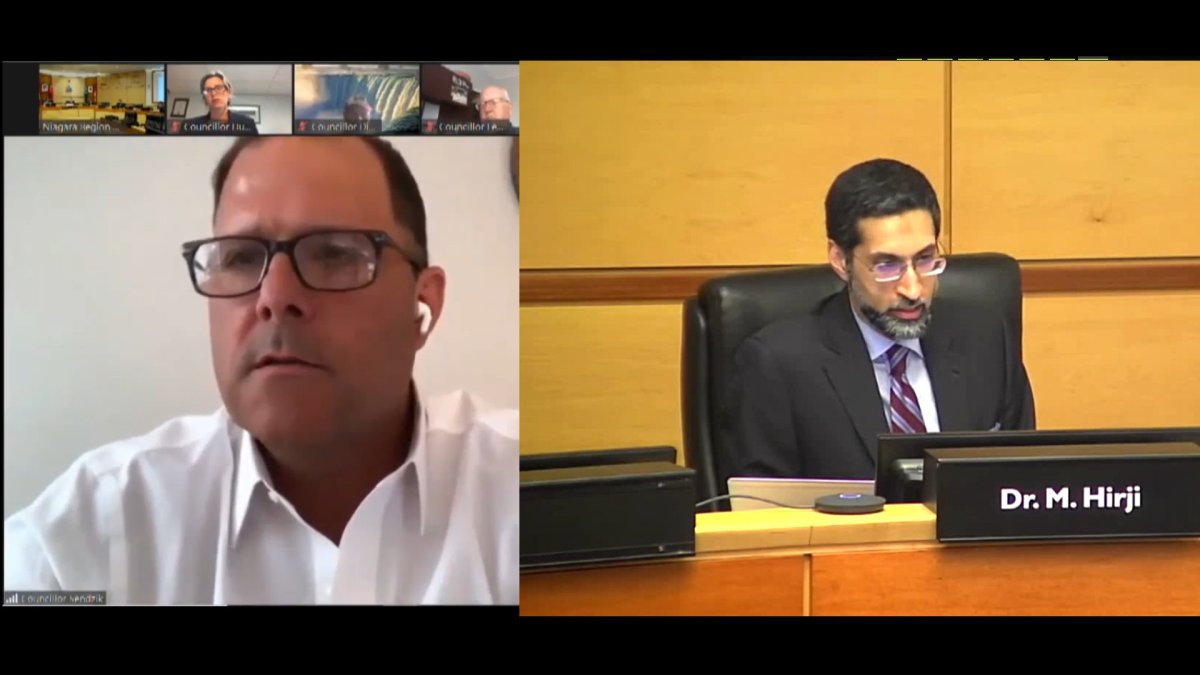An intense debate among Niagara regional councillors ended with the meeting’s chair breaking a stalemate and deferring a bylaw mandating face coverings for a future meeting.

The special council meeting on Wednesday, spurred on after several councillors said they were inundated by emails from people for and against a proposed bylaw, pitted a number of the region’s leaders in a polarizing deliberation that lasted almost five hours.
At the forefront of the argument were two of the region’s most notable mayors St. Catharines Walter Sendzik and Niagara Falls Jim Diodati, who were for and against the bylaw, respectively.
In the end, regional chair Jim Bradley opted to shelve the mask bylaw until July 23 with the final vote.
Much of the debate centred around how a bylaw could possibly be enforced with Diodati suggesting it couldn’t be since police and public health have neither the time nor resources to do it.
On Tuesday, Diodati told Global News that he encourages people to wear masks when physical distancing is not possible but does not support making masks mandatory believing it would be “unenforceable.”
“My approach has always been I’d rather catch somebody doing something right and reward that behaviour, rather than catching them doing something wrong and punishing them. I don’t believe the stick is the best approach.”
Meanwhile, Sendzik directed his case towards the region’s medical officer of health, Dr. Mustafa Hirji, asking him why it appeared he was not in consensus with a number of other medical officers of health and councils in Ontario which have enacted mandatory masking in public areas.
Sendzik referred to a report presented to regional councillors that listed a number of nearby regions like Kingston, Toronto, Kitchener, Guelph, Waterloo, Hamilton, and London that had moved quickly to enact mandatory face coverings either through a bylaw or public health order.
“You get a clear picture that public health in other jurisdictions are moving in a direction much quicker than us,” said Sednzik in Wednesday’s session.
“And the question to Dr. Hirji is, what are they seeing that you’re not?”
- Train goes up in flames while rolling through London, Ont. Here’s what we know
- Wrong remains sent to ‘exhausted’ Canadian family after death on Cuba vacation
- Liberals having ‘very good’ budget talks with NDP, says Freeland
- Peel police chief met Sri Lankan officer a court says ‘participated’ in torture
Hirji responded by saying there were 26 medical officers of health in Ontario who have not proposed a face-covering restriction.
“So there’s definitely some debate around us as a group,” said Hirji, “but I think that’s what you’re seeing — that there’s local variation in terms of what is the level of risk in the community, but also variation in terms of the greatness of the science right now.”
In the end, a potential vote on the bylaw was moved to the next regional council meeting and is expected to be further amended to look more like a bylaw soon to be implemented by Peel region.
Mississauga’s city council approved their face covering bylaw on Wednesday which will make masks mandatory in all indoor public spaces to prevent the spread of COVID-19.
People with medical conditions, respiratory issues and young children under five will be exempt from wearing masks in public spaces.
Despite a deferral in Niagara region, St. Catharines is still on course for a mandatory face-covering bylaw set for a July 13 vote.
The city’s legal team is moving forward on a mandatory mask bylaw which would begin on July 14 and expire on Aug. 24. It would also apply to all City of St. Catharines facilities open to the public, such as community centres, libraries and public transit.
In his pitch for the bylaw, Sendzik told councillors that St. Catharines and Niagara Region are destinations that attract people from all over the country and beyond.
The mayor rationalized his argument, saying he learned in a recent conversation with the mayor of Niagara-on-the-Lake that an estimated 50,000 to 60,000 vehicles have been visiting that municipality on the weekends.










Comments